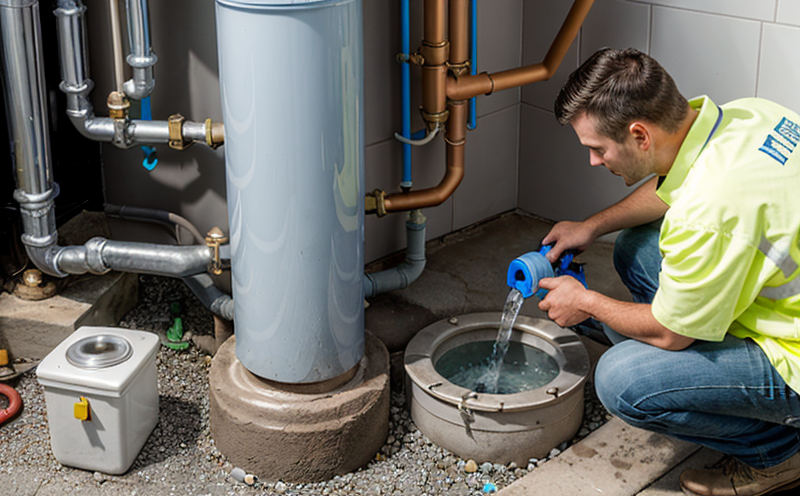EN 1717-4 Contamination Prevention Tests
The EN 1717 series of standards is designed to ensure that plumbing and water systems are safe for human use. Specifically, EN 1717-4 focuses on contamination prevention in these systems by setting stringent requirements for materials, design, installation, and maintenance practices. This service plays a critical role in ensuring the reliability and safety of water distribution networks.
The tests conducted under this standard aim to prevent contaminants from entering the potable water supply through various means such as leaching, migration, or other forms of contamination. The procedure outlined in EN 1717-4 is particularly important for materials that come into direct contact with drinking water, including pipes, fittings, and fixtures.
The testing process involves multiple stages to ensure comprehensive assessment. Initially, the material or system under test must be prepared according to specific guidelines provided by the standard. This includes cleaning the specimen thoroughly using appropriate solvents followed by rinsing with distilled water. Once prepared, the specimen is subjected to a series of immersion tests where it remains submerged in potable water for specified durations.
The primary goal during these immersions is to observe any changes in the properties of the material or system that could indicate potential contamination risks. Key parameters measured include pH levels, electrical conductivity, and the presence of various contaminants like heavy metals. If necessary, further tests may involve accelerated aging simulations to assess long-term stability.
After completing all prescribed procedures, detailed reports are generated summarizing findings from each stage of testing. These documents serve as crucial references for stakeholders involved in designing, manufacturing, installing, and maintaining plumbing systems compliant with EN 1717-4 standards. Compliance ensures protection against health hazards associated with contaminated water supplies.
Given the importance placed on public safety regarding drinking water quality, compliance with these regulations is non-negotiable. By adhering to EN 1717-4 guidelines during product development stages and ongoing quality control measures, manufacturers can significantly reduce risks related to microbial growth or chemical contamination within their products.
In summary, the EN 1717-4 Contamination Prevention Tests provide a robust framework for assessing material compatibility with potable water systems. Through rigorous testing protocols aimed at preventing contaminants from entering drinking water supplies, this service contributes substantially towards maintaining high standards of hygiene and safety in built environments worldwide.
Scope and Methodology
The scope of EN 1717-4 encompasses the prevention of contamination within plumbing systems through rigorous testing procedures. This includes evaluating materials, components, and assemblies that are expected to come into direct contact with potable water during their operational lifecycle. The methodology follows a systematic approach involving several key steps:
- Preparation: Specimens must be cleaned using appropriate solvents followed by thorough rinsing with distilled water.
- Immersion Testing: Prepared specimens are immersed in potable water for predetermined durations to monitor potential changes in material properties or performance characteristics.
- Parameter Measurement: During immersion, various parameters such as pH levels, electrical conductivity, and trace metal concentrations are continuously monitored.
- Post-Test Evaluation: After testing, specimens undergo visual inspection for signs of degradation, discoloration, or other indicators suggestive of contamination risk.
This comprehensive set of procedures ensures that any potential issues can be identified early in the development process, allowing manufacturers to make necessary adjustments before products reach end users. The results from these tests form an essential part of compliance documentation required for regulatory approval and market entry.
Eurolab Advantages
At Eurolab, we pride ourselves on offering unparalleled expertise in EN 1717-4 Contamination Prevention Tests. Our team comprises highly qualified professionals with extensive experience in the field of building and infrastructure testing who understand the intricacies involved in ensuring compliance with these stringent standards.
- Comprehensive Services: We provide a full range of services including initial consultation, sample preparation guidance, execution of all prescribed tests according to EN 1717-4 guidelines, and generation of detailed reports summarizing findings.
- State-of-the-Art Facilities: Our laboratory is equipped with advanced instrumentation capable of accurately measuring critical parameters during immersion testing. This ensures precise data collection which forms the basis for reliable conclusions about material compatibility.
- Consistent Quality Assurance: Every project undergoes stringent quality checks at multiple stages to maintain consistency and accuracy throughout the entire process. Our commitment to excellence guarantees that clients receive trustworthy results they can rely upon when making decisions related to product development or certification applications.
- Rapid Turnaround Times: Recognizing the time-sensitive nature of many projects, Eurolab strives to deliver quick yet thorough testing services without compromising on quality standards. This allows our clients to stay ahead in meeting deadlines and maintaining competitive edge.
By leveraging our specialized knowledge and resources, Eurolab ensures that every project receives personalized attention tailored specifically to meet individual client needs while adhering strictly to all relevant regulations and best practices.





